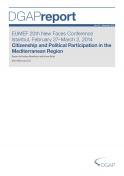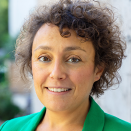Since the beginning of the uprisings in North Africa in 2010–11, and during the subsequent democratic transformations, the quantity, modes, and importance of citizen participation have changed considerably in the affected countries. In Turkey, the Gezi Park protests and demonstrations sparked intensive debate on citizen participation in decision making. In the course of these changes and debates, the conception of citizenship itself, what it means and entails, has come into question. Since the ousting of the authoritarian rulers in Egypt, Tunisia, and Libya, the rights and duties of citizens are being discussed, as are the shortcomings of certain conceptions and practices of citizenship, for example with regards to women or religious minorities. It is obvious that the opportunities for citizen participation in the so-called “Arab Spring countries” have improved enormously: relatively free and fair elections with the participation of many newly formed political parties guaranteed the formal political participation of citizens. Nonetheless, informal participation has remained relevant and it complements the former channels of participation. The frequency of demonstrations and the mushrooming of social movements and civil society organizations are clear manifestations of the significance and importance of informal channels. Despite these developments, there are still barriers preventing citizens in general from political participation, and there are particular barriers for certain groups in society, such as the poor, religious and ethnic minorities, and the youth.
In this context, the EU-Middle East Forum’s 20th New Faces Conference aimed to analyze changes in conceptions of citizenship in the Mediterranean region, especially in North Africa and Turkey, as well as opportunities and barriers to political participation and visions for the future.
The topics covered ranged from the reconceptualization of citizenship and participation -- with regard, for example, to the redistribution of wealth and the recognition of ethnic, demographic, gender, and other differences -- to questions related to the interplay of formal and informal channels of participation. The conference participants agreed that by exploring citizenship as a multilayered phenomenon, a move beyond binaries can materialize, capturing discussions about citizenship that are not always reflected in investigations of citizenship as a legal status. However, they also agreed that the counterproductive regression of citizenship rights in Turkey and many Arab countries, where exclusionary and nationalist discourses are gaining ground and finding followers, poses a major challenge.
The conference benefited substantially from the participants’ diverse backgrounds, which made it possible to examine the topic from many different angles and created a pleasant atmosphere and was very conductive to the debate. Presentations by renowned experts including Fuat Keyman (Director Istanbul Policy Center, Sabancı University), Nasar Meer (Co-Director of the Centre for Civil Society and Citizenship, CCSC, Northumbria University), and Emel Kurma (Director of Helsinki Citizens’ Assembly Turkey) further stimulated the debate and triggered new thinking processes.
The conference was organized in cooperation with the Robert Bosch Stiftung, the Friedrich Ebert Stiftung, and the ZEIT Stiftung.
Click here for the comprehensive conference report.


